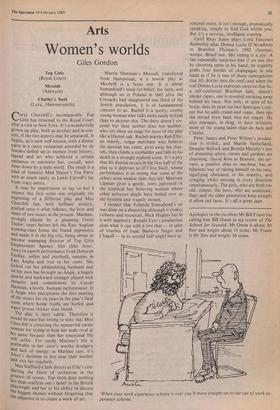Arts
Women's worlds
Giles Gordon
Top Girls (Royal Court)
Messiah (Aldwych)
Charley's Aunt (Lyric, Hammersmith)
Caryl Churchill's incomparable Top Girls has returned to the Royal Court after a visit to New York. It's a wonderfully grown-up play, both as artefact and in con- tent, if the two aspects may be separated. It begins, as is now well-known, with a dinner party in a classy restaurant attended by six females dolled up as women from history, legend and art who achieved a certain eminence or notoriety but, overall, were done down by a male world. The result is a kind of feminist Mad Hatter's Tea Party with as much sanity as Lewis Carroll's far from crazy antics.
It may be impertinent to say so but I suspect this first scene was originally the beginning of a different play and Miss Churchill has, with brilliant artistry, grafted onto it what follows, the lives and times of two sisters in the present. Marlene, strongly played by a gleaming Gwen Taylor, years before left the East Anglian working-class home she found oppressive and made it in the big city, being about to become managing director of Top Girls Employment Agency. Her elder sister, Joyce (a superb performance from Deborah Findlay, sullen and pinched), remains in East Anglia and true to her roots. She kicked out her philandering husband and on her own has brought up Angie, a hugely gauche and backward teenager played with integrity and commitment by Carole Hayman, a lovely, humane performance. It is Angie who precipitates the first meeting of the sisters for six years in the play's final scene where home truths are hurled and water proves thicker than blood.
The play is most subtle. Therefore it would be easy but wrong to state that Miss Churchill is criticising the unmarried career woman for trying to beat her male rival at his game because then her emotional life will suffer. For surely Marlene's life is Preferable to her sister's worthy drudgery and lack of energy: as Marlene says, it's Joyce's decision to live near their mother and visit her regularly.
Max Stafford-Clark directs as if he's con- ducting the finest of orchestras in the greatest of scores. Top Girls does nothing less than reaffirm one's belief in the British Playwright and her or his ability to discuss the biggest themes without forgetting that the objective is to create a work of art. Martin Sherman's Messiah, transferred from Hampstead, is a Jewish play as Macbeth is a Scots one. It is about humankind's need for belief, for faith, and although set in Poland in 1665 after the Cossacks had slaughtered one third of the Jewish population, it is of fundamental concern to us. Rachel is a spotty, toothy young woman who talks more easily to God than to anyone else. The deity doesn't res- pond but then neither does her mother, who sits silent on stage for most of the play like a blasted oak. Rachel marries Reb Ellis, an elderly, vulgar merchant who believes the messiah has come, gives away his chat- tels, then climbs a stepladder and falls to his death in a strongly realised scene. It's a pity that his demise occurs in the first half of the play as it deprives us of Clive Swift, whose performance is so strong that some of the others seem weaker than they are. Maureen Lipman gives a gentle, witty portrayal of the sceptical but believing woman where other actresses might have boiled over as the hysteria and tragedy mount.
l suspect that Yolanda Sonnabend's set was done on a shoestring although it evokes richness and resources. Mick Hughes has lit it with ingenuity. Ronald Eyre's production does what it can with a text that — in spite of touches of Isaac Bashevis Singer and Chagall — in its second half might have at- When your work experience scheme is over you'll move straight on to our out of work ex- perience scheme.' tempted more. It isn't enough, dramatically speaking, simply to find God within you. But it's a moving, intelligent evening.
Griff Rhys Jones plays Lord FanCourt Babberley alias Donna Lucia D'Alvadorez in Brandon Thomas's 1892 chestnut; woops, Brazil nut. His timing is a joy. A fan repeatedly surprises him if no one else by shooting open in his hand; he urgently grabs four bottles of champagne in one hand as if he is one of those contraptions that lift skittles into the roof; and when the real Donna Lucia expresses surprise that he, a self-confessed Brazilian lady, doesn't smoke cigars, one is revealed smoking away behind his back. Not only, in spite of his brain, does he pour tea into Spettigue's top- per but he adds cream and sugar, then tips the stirred brew back into the teapot. He also manages, in drag, to have infinitely more of the young ladies than do Jack and Charles.
Peter James and Peter Wilson's produc- tion is stylish, and Martin Sutherland, Douglas Bullock and Brenda Murphy's sets of dreaming spires, rooms and gardens are charming. David Ross as Brassett, the ser- vant, a positive deus ex machina, has an hilarious way of raising himself on his toes, signifying obeisance to his masters, and cringing whilst moving in every direction simultaneously. The girls, who are both too old, simper; the boys, who are undercast, flap; and the older generation keep straight if often red faces. It's all a great jape.






































 Previous page
Previous page